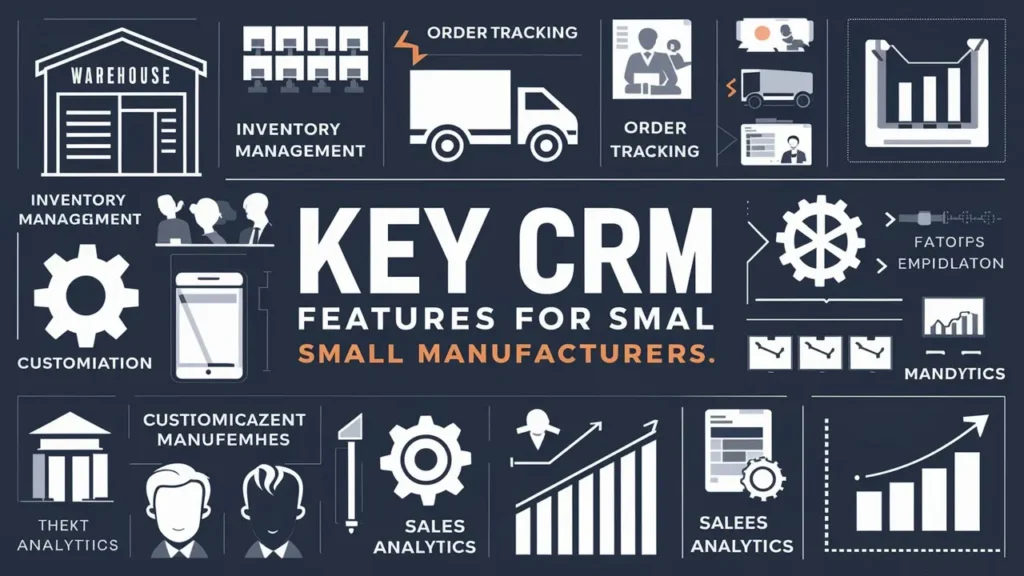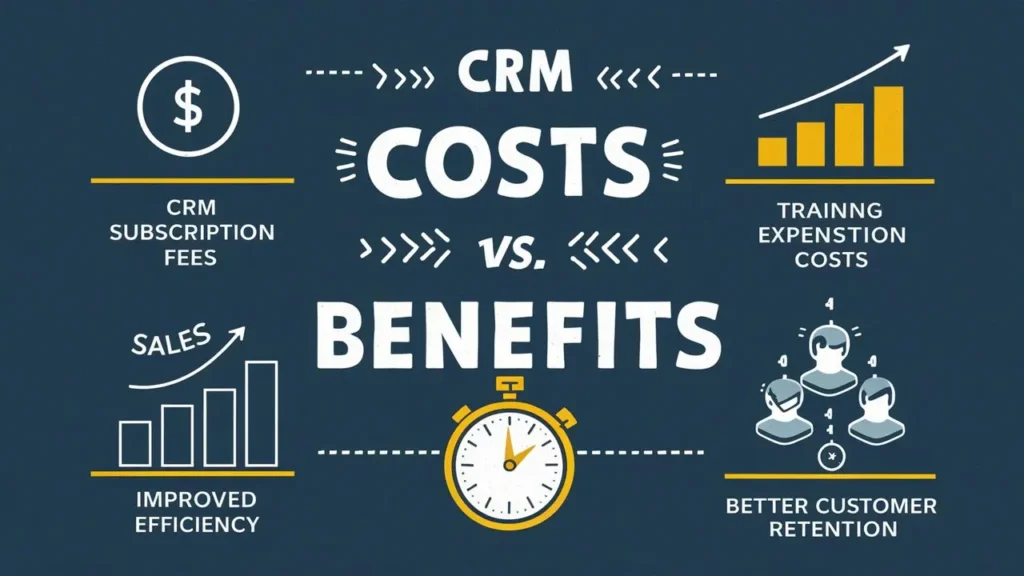Choosing the right CRM is essential for small manufacturing businesses. A good CRM helps manage customer relationships and streamline operations.
In today’s fast-paced market, small manufacturing businesses face unique challenges. They must balance production efficiency and customer satisfaction. This is where a reliable Customer Relationship Management (CRM) system comes into play. A good CRM can help track sales, manage leads, and improve communication.
It can also provide insights to enhance decision-making. With many options available, selecting the best CRM can seem overwhelming. The right choice can boost productivity, improve customer interactions, and lead to growth. This blog will explore the best CRM solutions tailored for small manufacturing businesses, helping you make an informed decision.
Overviews of Contents
ToggleIntroduction To Crm In Manufacturing
Customer Relationship Management (CRM) is vital for small manufacturing businesses. It helps manage customer interactions and improves relationships. A good CRM system streamlines processes and boosts productivity. It allows manufacturers to focus on growth and customer satisfaction.
The Role Of Crm
CRM plays a key role in small manufacturing. It helps in:
- Managing Customer Data: Store and organize customer information.
- Tracking Interactions: Monitor customer communications and history.
- Improving Sales: Analyze sales data to find opportunities.
- Enhancing Service: Provide better support to customers.
With these features, CRM systems help manufacturers understand their customers better. They can respond faster and more effectively.
Want to learn more about CRM? This post could provide more insights. Payroll in Canada: Essential Tips for Businesses
Benefits For Small Manufacturers
| Benefit | Description |
|---|---|
| Increased Efficiency | Automate routine tasks to save time. |
| Better Customer Insights | Gain a clear view of customer needs and preferences. |
| Improved Communication | Streamline communication within teams and with customers. |
| Higher Sales | Identify leads and close deals more effectively. |
| Enhanced Customer Satisfaction | Respond quickly to customer inquiries and issues. |
These benefits help small manufacturers stay competitive. They can adapt to market changes and meet customer demands.
Key Features Of Crm For Manufacturing
A good CRM for manufacturing helps streamline operations. It connects sales, production, and customer service. Here are some key features to consider.

Inventory Management Integration
Inventory management is crucial for manufacturers. A strong CRM connects with inventory systems. This helps track stock levels in real-time. It reduces the risk of overstocking or stockouts.
With effective inventory integration, users can manage supplies easily. They can see what is available and what needs reordering. This saves time and improves efficiency.
Customer Order Tracking
Tracking customer orders is essential. A good CRM allows manufacturers to monitor orders from start to finish. Customers can see order status anytime. This improves customer satisfaction and trust.
Order tracking also helps manage expectations. Teams can address issues before they escalate. Clear communication leads to happier customers.
Customization Options
Every manufacturing business is unique. A flexible CRM offers customization options. Users can tailor the system to fit their needs.
Custom fields, reports, and dashboards enhance usability. Teams can focus on what matters most. Personalized solutions lead to better results.
Looking for more insights on CRM? You may find this post valuable. Quickbooks Payroll Core Vs Premium: Which Is Right for You?
Analyzing Top Crm Options
Choosing the right CRM for small manufacturing businesses is crucial. Each option offers unique features. Understanding these features helps in making the right choice.
Here, we analyze three top CRM options. These tools can enhance productivity and streamline operations.
Salesforce For Manufacturing
Salesforce is a leading CRM platform. It provides strong customization options. This flexibility is key for manufacturers. You can tailor it to fit your specific processes.
Salesforce offers advanced reporting tools. These tools help track production metrics. You can gain insights into sales and customer interactions.
Its user-friendly interface is another plus. Teams can easily navigate the system. This ease of use boosts employee adoption.
Hubspot Crm
HubSpot CRM is known for its simplicity. It provides essential features without complexity. This makes it ideal for small manufacturing businesses.
HubSpot offers excellent integration capabilities. You can connect it with other tools you use. This helps streamline workflows and saves time.
The free version is attractive for small businesses. It allows companies to get started without financial strain. Users can upgrade as their needs grow.
Pipedrive For Production Tracking
Pipedrive focuses on sales pipeline management. It helps track leads and sales processes. This is crucial for manufacturing companies.
The visual dashboard is easy to understand. Teams can see their progress at a glance. This clarity helps in making informed decisions.
Pipedrive also integrates well with other software. This ensures that all business functions work together smoothly. Efficient tracking leads to better overall productivity.
Dive deeper into CRM by checking out this article. Best Payroll Deduction Loans: Simplify Your Finances Today
Cost-benefit Analysis
Cost-Benefit Analysis helps small manufacturing businesses choose the best CRM. It compares the costs of a CRM system with the benefits it provides. This analysis shows if the investment is worth it. Understanding the pricing and potential return on investment is key.

Understanding Pricing Models
Different CRM systems offer various pricing models. It is important to select one that fits your budget. Here are common pricing models:
- Subscription-based: Monthly or yearly fees.
- One-time payment: A single upfront cost.
- Freemium: Basic features free; paid upgrades available.
Each model has pros and cons. Subscription models offer flexibility. One-time payments can save money long term. Freemium models provide a low-cost entry point.
Roi For Small Businesses
Return on Investment (ROI) measures how much value a CRM brings. For small businesses, understanding ROI is crucial.
Consider these factors to calculate ROI:
- Increased sales due to better customer management.
- Improved efficiency in operations.
- Enhanced customer satisfaction leading to repeat business.
Use the following formula to calculate ROI:
ROI = (Net Profit / Cost of Investment) x 100
For example, if a CRM costs $1,000 and generates $5,000 in sales:
| Metric | Value |
|---|---|
| Cost of CRM | $1,000 |
| Sales Generated | $5,000 |
| Net Profit | $4,000 |
| ROI | 400% |
A high ROI shows that the CRM investment is beneficial. Always evaluate costs against the expected gains. This helps ensure the chosen CRM meets business needs.
Explore more about CRM with this related post. How Do I Contact Quickbooks Payroll Support Phone Number Easily?
Ease Of Use And Implementation
Choosing the right CRM for a small manufacturing business is crucial. Ease of use and quick implementation are key factors. A user-friendly system helps teams work more efficiently. Businesses save time and effort during setup.
User-friendly Interfaces
A user-friendly interface is essential for any CRM. It allows users to navigate the system easily. Look for CRMs that offer:
- Simple dashboards
- Clear menu options
- Customizable views
These features make daily tasks easier. Employees spend less time learning the system. They can focus on their work instead. A clean layout helps everyone feel comfortable.
Training And Support Services
Good training and support services are vital. They help users understand the CRM quickly. Most providers offer various resources such as:
- Online tutorials
- Webinars
- User manuals
- Live chat support
These resources ensure a smooth transition. Teams can ask questions and get help when needed. Fast response times can make a big difference. A strong support system boosts confidence in using the CRM.
Integrations And Scalability
Integrations and scalability are key for small manufacturing businesses. A good CRM should easily connect with other tools. This helps streamline processes and improve efficiency. Scalability allows the CRM to grow with the business. It should adapt as needs change over time.
Erp System Compatibility
Choosing a CRM that works well with your ERP system is crucial. This compatibility ensures smooth data flow between systems. Here are some benefits:
- Real-time data access: Access updated information instantly.
- Reduced manual entry: Save time and minimize errors.
- Improved reporting: Generate accurate reports with integrated data.
Before selecting a CRM, check if it supports your ERP system. Consider options that offer:
- Pre-built integrations.
- API access for custom connections.
- Support for various ERP platforms.
Scaling With Business Growth
As your business grows, your CRM must grow too. A scalable CRM can handle more users and data. It should adapt to new processes easily. Look for features that support growth:
- User management: Add or remove users effortlessly.
- Customizable features: Tailor the CRM to fit changing needs.
- Flexible pricing: Choose plans that grow with your business.
Evaluate potential CRMs based on scalability. Ask these questions:
- Can it handle increased data volume?
- Does it offer additional features for larger teams?
- Is customer support available as needed?
Finding the right CRM with strong integrations and scalability can support long-term success.
Customer Service And Relationship Management
Customer service is vital for small manufacturing businesses. Strong relationships lead to loyalty. Good CRM systems help manage these connections effectively. They keep track of customer interactions. This information guides better service and support.

Enhancing Customer Interactions
Effective communication is key. CRM tools organize customer data. They store contact details, purchase history, and preferences. This data allows personalized service. Customers feel valued when you know their needs.
Quick responses matter. A good CRM system helps track inquiries. It ensures no message goes unanswered. Timely answers improve customer satisfaction. Happy customers are more likely to return.
Building Long-term Relationships
Long-term relationships foster trust. Trust leads to repeat business. CRM systems help maintain these connections. They remind you of important dates, like follow-ups or anniversaries.
Regular check-ins show you care. Use CRM reminders to reach out. Ask for feedback and suggestions. Customers appreciate businesses that listen. Building a relationship takes time and effort.
Data analysis can guide your approach. Understand buying patterns and preferences. Tailor your offerings based on this information. Customers feel special when you cater to their needs.
Security And Compliance
Security and compliance are vital for small manufacturing businesses. Protecting data and meeting regulations keeps your business safe. Customers trust you more when they see strong security measures. Let’s explore key aspects of security and compliance.
Data Protection Features
Data protection features are essential for any CRM system. They ensure your business data remains safe. Here are important features to consider:
- Encryption: Protects data during transfer and storage.
- Access Controls: Limits who can view or edit data.
- Regular Backups: Keeps data safe in case of loss.
- Audit Trails: Tracks who accessed data and when.
- Secure Cloud Storage: Stores data in secure online locations.
Regulatory Compliance For Manufacturers
Manufacturers must follow specific regulations. Compliance helps avoid legal issues. Here are key regulations to consider:
| Regulation | Description |
|---|---|
| ISO 9001 | Focuses on quality management systems. |
| GDPR | Protects personal data of EU citizens. |
| HIPAA | Applies to healthcare-related data. |
Ensuring compliance helps build customer trust. Regular audits can help maintain standards. Choose a CRM that supports compliance efforts.
Case Studies And Success Stories
Learning from others helps small manufacturing businesses grow. Real examples show how CRM systems can make a difference. Here are some stories of success.
Real-world Applications
One small manufacturing company, ABC Widgets, needed better customer tracking. They chose a simple CRM. This helped them organize customer data easily.
With the new system, ABC Widgets improved response times. Customers received faster updates on their orders. This led to higher satisfaction and repeat business.
Another company, XYZ Parts, faced challenges with inventory management. They implemented a CRM that included inventory features. It allowed them to see stock levels in real-time.
This change reduced the chances of stockouts. They could fulfill orders on time. As a result, XYZ Parts saw a 20% increase in sales.
Testimonials From Small Businesses
Owners of small businesses share positive feedback about their CRM experiences. Jane, a manager at ABC Widgets, said, “Our CRM changed how we interact with customers.”
She noted that tracking customer interactions was easier. “I can find information quickly. This saves time and helps our team work better,” she added.
Tom, the owner of XYZ Parts, praised their new system too. He stated, “The CRM helped us manage orders smoothly. We are more efficient now.”
These stories show how CRMs can help small manufacturers succeed. Simple solutions lead to big results.
Credit: dwr.com.au
Choosing The Right Crm
Choosing the right CRM for your small manufacturing business is crucial. A good CRM can help manage customer relationships effectively. It can streamline operations and improve sales. Finding the best fit requires careful consideration.
Assessing Your Business Needs
Start by identifying your specific needs. Consider these key factors:
- Size of your business: How many users will need access?
- Type of products: What kind of products do you manufacture?
- Customer interactions: How often do you interact with customers?
- Sales process: What does your sales process look like?
Gather input from your team. Understand their challenges and preferences. This will help you choose a CRM that fits. Evaluate different features. Focus on:
- Contact management
- Sales tracking
- Reporting and analytics
- Integration with other tools
Making An Informed Decision
After assessing your needs, research available CRMs. Compare options side by side. Use a table for clarity:
| CRM Name | Key Features | Price |
|---|---|---|
| CRM A | Contact management, Sales tracking | $30/month |
| CRM B | Reporting, Integration | $50/month |
| CRM C | Analytics, Customization | $40/month |
Consider the cost of each option. Make sure it fits your budget. Look for free trials. Test the software before you commit. Get feedback from your team during the trial. Ensure it meets their needs.
A solid CRM will help your manufacturing business grow. It can improve customer satisfaction. It can increase sales and efficiency. Make your decision wisely.
Future Trends In Crm For Manufacturing
The future of CRM in manufacturing is bright. New technologies will shape how businesses connect with customers. Companies must adapt to these trends to stay competitive. Understanding future trends can help small manufacturers thrive.

Ai And Machine Learning
AI and machine learning are changing CRM. These technologies can analyze customer data quickly. They help businesses predict customer needs. This leads to better service and stronger relationships.
Small manufacturers can use AI to automate tasks. This saves time and reduces errors. Personalized marketing becomes easier with machine learning. Customers receive offers tailored to their interests.
AI tools can also help in decision-making. They analyze trends and provide insights. Manufacturers can respond faster to market changes. This boosts efficiency and keeps customers happy.
The Impact Of Iot On Crm
The Internet of Things (IoT) is transforming CRM. Devices can now collect data in real-time. This information is valuable for understanding customer behavior.
Manufacturers can track product usage and performance. This data helps in improving products and services. Customers appreciate manufacturers who listen to their feedback.
IoT also helps in predictive maintenance. Companies can alert customers before issues arise. This proactive approach builds trust and enhances customer loyalty.
Integrating IoT with CRM systems will become common. It will provide a complete view of customer interactions. Small manufacturers should embrace this trend to stay relevant.
Conclusion And Next Steps
Choosing the right CRM for your small manufacturing business is crucial. It can improve efficiency and customer relationships. Once you select a CRM, the next steps are vital for success.
Implementing Your Chosen Crm
Start by training your team. Make sure everyone understands how to use the new system. This training helps avoid mistakes and improves adoption.
Next, integrate the CRM with your existing tools. This integration streamlines processes and saves time. Ensure data flows smoothly between systems.
Finally, encourage feedback from your team. Their insights can help you optimize the CRM usage. Adjust the setup based on their experiences.
Measuring Success And Adjusting Strategies
Track key performance indicators (KPIs) to measure success. Look at customer satisfaction, response times, and sales growth. These metrics show how well the CRM is working.
Regularly review the data to spot trends. This helps you identify areas that need improvement. Adjust your strategies based on these insights.
Stay open to new features and updates. CRMs often release enhancements that can improve your operations. Keep your system updated to make the most of these advancements.
Frequently Asked Questions
A CRM for manufacturing should include features like inventory management, order tracking, and customer communication tools. These features help streamline operations and improve customer relationships. Additionally, integration with other software systems, such as ERP, is vital for seamless data flow and enhanced efficiency.
A CRM can improve manufacturing processes by enhancing communication and collaboration among teams. It provides real-time insights into customer needs and order statuses. This leads to better decision-making, increased efficiency, and improved customer satisfaction. Ultimately, a well-implemented CRM can drive growth and profitability in manufacturing.
CRM software can vary in cost, but many options cater to small businesses. Several affordable solutions offer essential features without breaking the bank. Some CRMs even provide free plans or trials, making it easier for small manufacturers to find a suitable option that fits their budget.
To choose the best CRM, consider your specific business needs and goals. Look for software that offers essential features like lead management and analytics. Additionally, evaluate user-friendliness, customer support, and integration capabilities. Reading reviews and comparing pricing can also help you make an informed decision.
Conclusion
Choosing the right CRM for your small manufacturing business matters. It can improve customer relationships and streamline operations. Look for features that fit your needs. Simple tools often work best. A good CRM helps you track sales and manage contacts easily.
Don’t forget to consider your budget. Take your time to find the best fit. This decision can lead to better growth and success for your business. Start exploring your options today and see what works for you. Your business deserves the best support.




